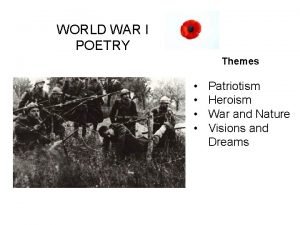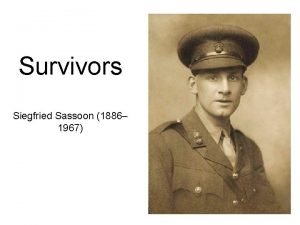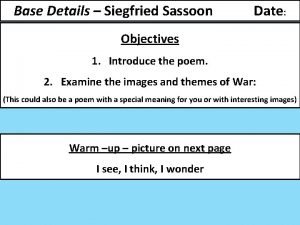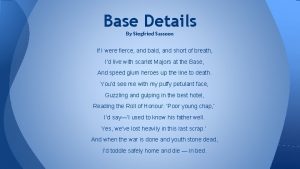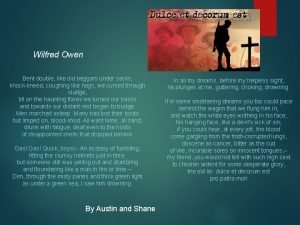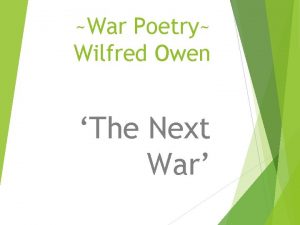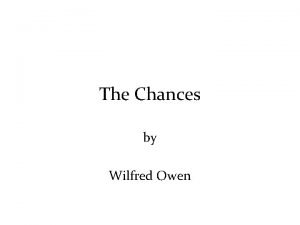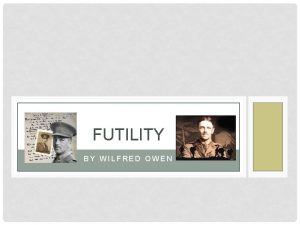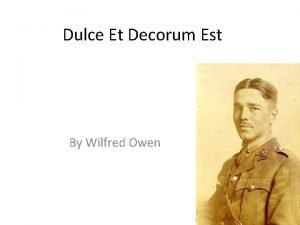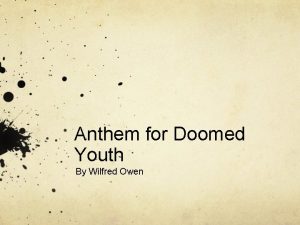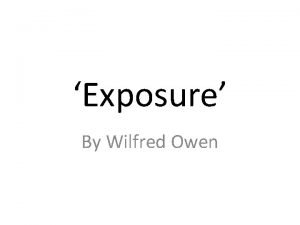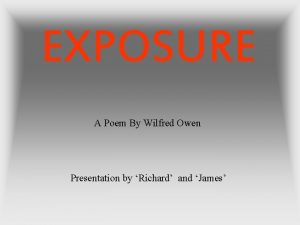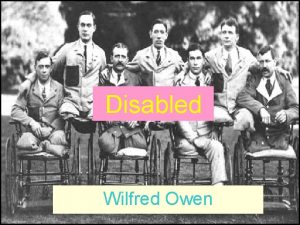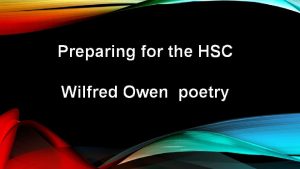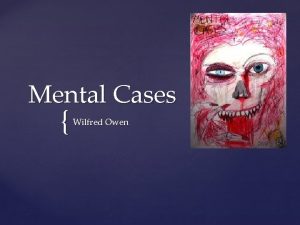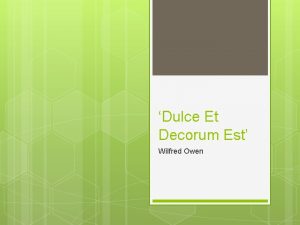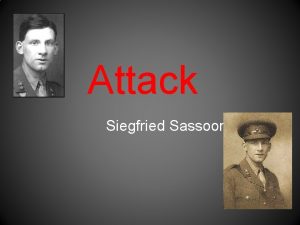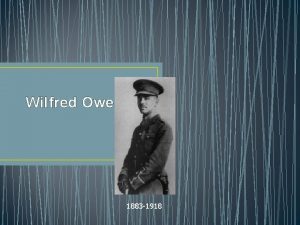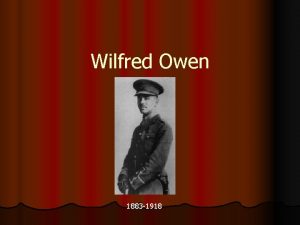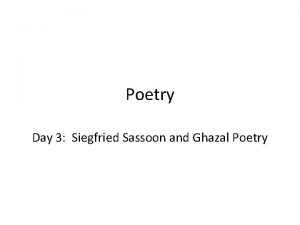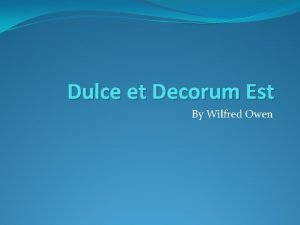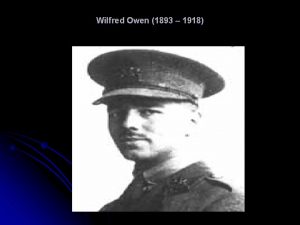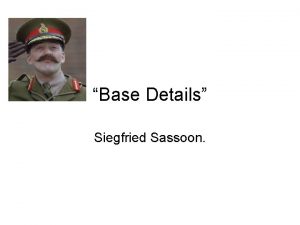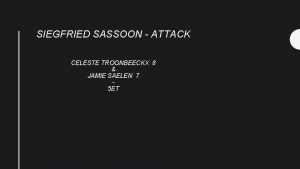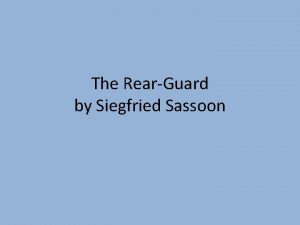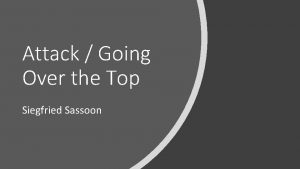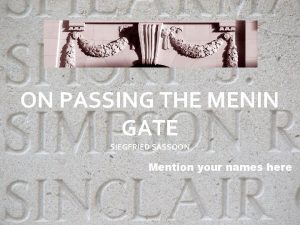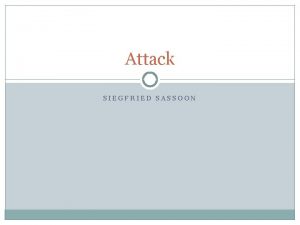WWI Poetry Siegfried Sassoon and Wilfred Owen Siegfried


















- Slides: 18

WWI Poetry Siegfried Sassoon and Wilfred Owen

Siegfried Sassoon Sept 8, 1886 – Sept 1, 1967 • Was born and grew up in Weirleigh in Kent • His Jewish father was disinherited for marrying his Anglo-Catholic mother; they separated when he was 4. Father died when Siegfried was 9. • No German ancestors, but mother loved Wagner’s operas, so named him Siegfried • Went to prep school, Marlborough College, and then Clare College (Cambridge) for history

Siegfried Sassoon continued… • Expressed political opinions before WWI: – “France was a lady, Russia was a bear, and performing in the county cricket team was much more important than either of them. ” • • Joined the army the day the UK declared war Broke his arm in riding accident before leaving Younger brother was killed in Gallipoli Commissioned and in Nov 1915 was sent to the 1 st Battalion in France, where he met fellow poet Robert Graves, who later said Sassoon engaged in suicidal feats of bravery

Siegfried Sassoon continued… • While on the Western Front, he single-handedly, yet vaingloriously, captured a German trench in the Hindenburg Line • July 17, 1916, he was awarded the Military Cross: “ 2 nd Lt. Siegfried Lorraine [sic] Sassoon, 3 rd (attd. 1 st) Bn. , R. W. Fus. For conspicuous gallantry during a raid on the enemy's trenches. He remained for 1½ hours under rifle and bomb fire collecting and bringing in our wounded. Owing to his courage and determination all the killed and wounded were brought in. ”

Glory of Women by Siegfried Sassoon (Oct 1917; pub. 1918) You love us when we’re heroes, home on leave, Or wounded in a mentionable place. You worship decorations; you believe That chivalry redeems the war’s disgrace. You make us shells. You listen with delight, By tales of dirt and danger fondly thrilled. You crown our distant ardours while we fight, And mourn our laurelled memories when we’re killed. You can’t believe that British troops ‘retire’ When hell’s last horror breaks them, and they run, Trampling the terrible corpses—blind with blood. O German mother dreaming by the fire, While you are knitting socks to send your son His face is trodden deeper in the mud.

Suicide in the Trenches by Siegfried Sassoon (pub. 1918) I knew a simple soldier boy Who grinned at life in simple joy, Slept soundly through the lonesome dark, And whistled early with the lark. In winter trenches, cowed and glum, With crumps and lice and lack of rum, He put a bullet through his brain. No one spoke of him again. ---------You smug-faced crowds with kindling eye Who cheer when soldier lads march by, Sneak home and pray you’ll never know The hell where youth and laughter go.

Siegfried Sassoon continued… • In 1917, he made a stand against the conduct of the war. Instead of being court-martialed for refusing to return to duty, he was sent to Craiglockhart War Hospital near Edinburgh, where he was treated for neurasthenia (“shell shock”) • There, he met fellow poet Wilfred Owen, where he mentored him and commented on his poems.

Craiglockhart War Hospital

Wilfred Owen March 18, 1893 – Nov 4, 1918 • Born in Shropshire to English & Welsh parents • Raised as an Anglican • Accepted to University of London, but not for a scholarship, so he couldn’t go. Later attended classes at University of Reading. • Worked as a private tutor for English and French at the Berlitz School in Bordeaux.

Wilfred Owen continued… • Enlisted in the Artists’ Rifles Officers’ Training Corps on October 21, 1915. • Described the troops in his company as “expressionless lumps” in a letter to his mother • Traumatic experiences: – Fell into a shell hole and suffered a concussion – Blown high into the air by a trench mortar and spent several days lying out on an embankment amongst the remains of a fellow officer

Wilfred Owen continued… • Was sent to Craiglockhart War Hospital for treatment for neurasthenia (“shell shock”) • In November 1917 he was discharged and in March 1918 he was posted to a unit in northern England, and in August of 1918 returned to the front near Joncourt, France. • On Nov 4, one week before the armistice, he was attempting to cross the Sambre canal and was shot and killed. The news reached his parents on Armistice Day.

Wilfred Owen continued… • He was posthumously awarded the Military Cross: – 2 nd Lt, Wilfred Edward Salter Owen, 5 th Bn. Manch. R. , T. F. , attd. 2 nd Bn. For conspicuous gallantry and devotion to duty in the attack on the Fonsomme Line on October 1 st/2 nd, 1918. On the company commander becoming a casualty, he assumed command showed fine leadership and resisted a heavy counter-attack. He personally manipulated a captured enemy machine gun from an isolated position and inflicted considerable losses on the enemy. Throughout he behaved most gallantly.

Anthem for Doomed Youth by Wilfred Owen (written 1917; pub. 1920) What passing-bells for these who die as cattle? Only the monstrous anger of the guns. Only the stuttering rifles' rapid rattle Can patter out their hasty orisons. No mockeries now for them; no prayers nor bells, Nor any voice of mourning save the choirs, The shrill, demented choirs of wailing shells; And bugles calling for them from sad shires. What candles may be held to speed them all? Not in the hands of boys, but in their eyes Shall shine the holy glimmers of goodbyes. The pallor of girls' brows shall be their pall; Their flowers the tenderness of patient minds, And each slow dusk a drawing down of blinds.

Dulce Et Decorum Est by Wilfred Owen (written 1917; pub. 1920) Bent double, like old beggars under sacks, Knock-kneed, coughing like hags, we cursed through sludge, Till on the haunting flares we turned our backs And towards our distant rest began to trudge. Men marched asleep. Many had lost their boots But limped on, blood-shod. All went lame; all blind; Drunk with fatigue; deaf even to the hoots Of tired, outstripped Five-Nines that dropped behind. Gas! Quick, boys! – An ecstasy of fumbling, Fitting the clumsy helmets just in time; But someone still was yelling out and stumbling, And flound'ring like a man in fire or lime. . . Dim, through the misty panes and thick green light, As under a green sea, I saw him drowning.

Dulce Et Decorum Est continued… by Wilfred Owen (written 1917; pub. 1920) In all my dreams, before my helpless sight, He plunges at me, guttering, choking, drowning. If in some smothering dreams you too could pace Behind the wagon that we flung him in, And watch the white eyes writhing in his face, His hanging face, like a devil's sick of sin; If you could hear, at every jolt, the blood Come gargling from the froth-corrupted lungs, Obscene as cancer, bitter as the cud Of vile, incurable sores on innocent tongues, My friend, you would not tell with such high zest To children ardent for some desperate glory, The old Lie; Dulce et Decorum est Pro patria mori.


Further Reading

Credits • http: //newsimg. bbc. co. uk/media/images/40433000/jpg/_40433315_sass oon 2_203. jpg • http: //en. wikipedia. org/wiki/Siegfried_Sassoon • http: //img. literatuurplein. nl/blobs/ORIGP/181303/1/1. jpg • http: //en. wikipedia. org/wiki/Wilfred_Owen • http: //api. ning. com/files/dhwp. GM 7 Yv. Zg. XGSM 4 Ik. GPlb. QLNnu. Ti. L 8 e 6 p. W*p. VDh. Is 3 RIW 0 Ag. W 7 p. E 7 n. PPXbpvy. Ob. VU*FYL 2 yly 4785 Zmn 03 Ld. NSSn 4 C 7 Zjb/wilfredowen. jpg • http: //www. warpoetry. co. uk/owen 1. html#READINGS • http: //farm 6. staticflickr. com/5006/5377312921_3 e 80 d 2 bd 6 f_z. jpg • http: //www. stephandtonyinvestigate. com/wpcontent/uploads/2010/05/regeneration. jpg • http: //www. bbc. co. uk/history/worldwars/wwone/images/wilfred_owen_ craiglockhart. jpg
 Dulce et decorum est wilfred owen analysis
Dulce et decorum est wilfred owen analysis Siegfried sassoon zanichelli
Siegfried sassoon zanichelli Survivors poem analysis
Survivors poem analysis Base details tone
Base details tone Base details full poem
Base details full poem Bent double like old beggars
Bent double like old beggars Dulce et decorum est structure
Dulce et decorum est structure The send off wilfred owen
The send off wilfred owen The chances wilfred owen analysis
The chances wilfred owen analysis Wilfred owen futility analysis
Wilfred owen futility analysis Exposure wilfred owen
Exposure wilfred owen Dulce et decorum est rhyme
Dulce et decorum est rhyme Anthem for doomed youth rhyme scheme
Anthem for doomed youth rhyme scheme Exposure poem form
Exposure poem form Exposure wilfred owen summary
Exposure wilfred owen summary Disabled wilfred owen
Disabled wilfred owen Wilfred owen poems hsc
Wilfred owen poems hsc Mental cases wilfred owen
Mental cases wilfred owen Futility wilfred owen analysis line by line shmoop
Futility wilfred owen analysis line by line shmoop
